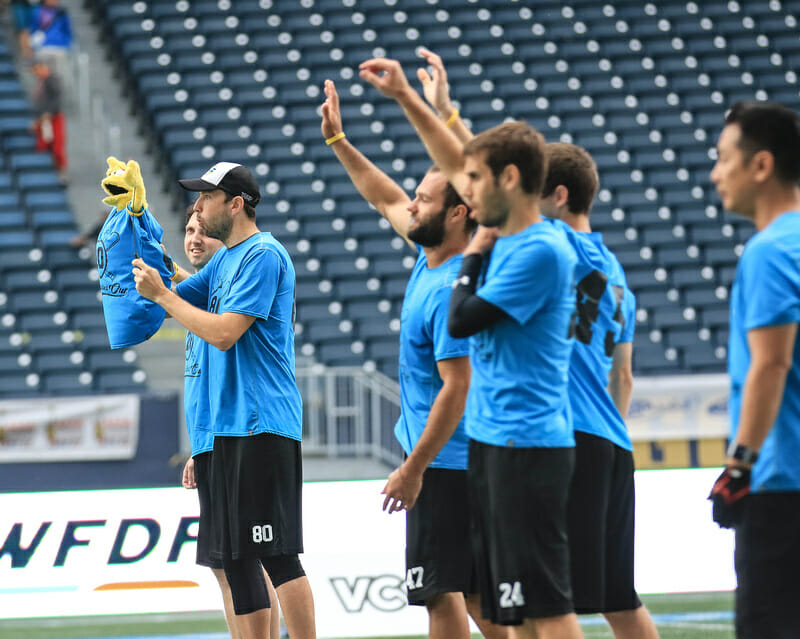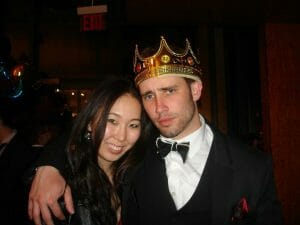A tribute to a fallen teammate, three years after his passing.
April 21, 2020 by Jennifer O'Connell in Opinion with 0 comments

It’s the final of the 2018 World Masters Ultimate Club Championships in Winnipeg, and All Bashed Out, the Masters Men’s team from New York, is about to begin the game one man down.
“Do what you gotta do,” says Billy Olli, the captain. He knows that when they talk about what they’re going to do, they don’t usually score. “If things get really ugly, huck it to Shockey.”
It worked once before, at Nationals—a Hail Mary throw to John “Shockey” Palmer, their tallest player, in the end zone. Actually, much of All Bashed Out’s runs at Nationals and Worlds have been just that: a prayer. This team was not designed to win. They’re not supposed to have made it this far, this group of old friends, past their prime, in various stages of decline from their physical peaks. Their only claim to this field is their love for the man they play for. It’s their single advantage, the one thing the other teams can’t account for.
Boneyard, the reigning world champions, line up their seven defenders and prepare to pull. The six players from All Bashed Out who take the line are not necessarily the fastest, most skilled, or well-conditioned players on the team, but the ones who knew Ryan West the longest. At their founding, the team set a rule that they’ve abided by since: Ryan’s going to start the first point of every tournament we play, and if we make the final, he’s going to start the final as well.
On the line, Shockey raises his right arm to signal for the pull. In his other hand is their seventh man, wearing Ryan’s double-zero jersey—a yellow puppet.
***
In 2007, I made it onto my first mixed club team, a squad from New York who called themselves the Bashing Piñatas. The core of the team was a group of SUNY alums from Buffalo and Albany—talented frisbee players who showed their love for each other in strange ways. On long car trips to tournaments, they’d do something called “Savaging,” where at a rest stop they’d hand someone a quarter for the payphone and then pile into the car and drive away, leaving him to find his own way home. Every Christmas, they’d undergo the Eggnog Challenge, where they’d see how long they could live on nothing but eggnog and water. They printed thousands of stickers with Buffalo Ultimate alum Tim “Tank” Thorpe’s face on them and plastered them on street signs around New York City. When former teammate Chris Mazur moved to Texas, they convinced people from all over the world to anonymously mail him clown noses. Nobody was allowed to take themselves too seriously. And in the middle of it all, hatching plans and instigating pranks, was the captain of the Bashing Piñatas—a man named Ryan West.
They called him “The King,” and I believed that was his name because all things—games, practical jokes, late-night conversations—seemed to revolve around him. He had crooked front teeth that gave him the tiniest of lisps, which vanished as soon as he spoke into a microphone. When he wasn’t wearing his latest pair of stunner shades, which was not often, you could see his small, merry eyes scrunch up when he laughed. He wore all of his hats cocked slightly to the side—an off-kilter crown.
Ryan would do anything for the limelight. His small New York City apartment was full of elaborate Halloween costumes, board games, and brightly-colored puppets that sat in corners and hung off the furniture. Ryan’s reputation flew around the frisbee world in the form of Chuck-Norris-style stories from tournaments: the afternoon he dislocated his elbow in a blindfolded boxing match at Fools Fest; the time at Trouble in Vegas when he crashed a Cougar Convention, won $1,000 playing craps, ate a chipwich and gummy bears for breakfast the next morning, and then took a limo to the fields.
Once, at the Wildwood beach tournament in New Jersey—which always fell on his birthday weekend—a group of players from another team climbed up on the beer garden stage to sing happy birthday to their friend. A little while later, Ryan’s teammates turned around to see him up on stage, somberly singing happy birthday to himself.

Yet for all his pranks, there was a serious dedication that permeated Ryan’s play. The Bashing Piñatas had found unexpected success during that 2007 season, but our greatest surprise came at Regionals in Devens. I remember that Sunday as a blur of gritty layouts, long hucks, hard cuts, and timeout dance parties while the other teams looked on, confused at how we could be acting so silly on the one day of the season everything really mattered. It was late in the afternoon, and we had been engaged in sweaty, grass-stained battle since nine in the morning. Somehow we had made it into the game-to-go to Nationals, and were up 14-10 over Puppet Regime. I was streaking toward the end zone, my defender trailing me. Dave Tedeyan, who always plays with a red tail tucked into his shorts, was running deep to the other corner. I can still feel the burn in my lungs, the acid in my legs. The throw went up, I looked skyward and saw the disc floating above us, just for a moment, and then it settled on the breeze and dropped into Dave’s outstretched hands. His fingers closed around it.
The field exploded into blue. The entire Bashing Piñatas sideline was running toward us, leaping, dancing, hoisting each other up on their shoulders, a mess of tears and voices. Someone dumped a cooler of water over Ryan’s head. Dave, with the frisbee still in his hands, threw his arms and legs around me and lifted himself off the ground. We had done it: our scrappy, underdog team was going to the National Championships in Sarasota. We’d played our hearts out into the long afternoon, and the cards had fallen our way. We were unsurpassable in our joy.
For five days, simply thrilled to be there, Bashing took Sarasota by storm. We rented a house on the beach and raced tandem bikes underwater across the bottom of the swimming pool. The rules at Nationals required we flip to determine who started on offense, so we brought a water balloon launcher and flipped our disc twenty feet in the air. And, no matter the score, we danced. Seeded dead last at 16th coming in, we finished 11th.
At the awards ceremony on the day of the finals, the tournament director handed Ryan the Team Spirit Award—a beautifully engraved wooden frisbee—and in his best imitation of a poor-spirited endzone spike, Ryan waved it in our faces and then threw it down hard on the grass. We were young and on fire — everything and nothing mattered.
I didn’t realize it at the time, but the two years I played for Bashing would become my ultimate genesis story. Never again would I be content on a team that wasn’t equal parts competition and joy.
***
After I graduated from college, I got a job out West and moved across the country to San Francisco. As I started my career, I continued to play ultimate, though for me it was missing something. The Bashing Piñatas were dogged, extravagant, giddy in their pursuit of fun. To hang out with that team was to drive your life like you stole it. To play on that team was to be all in.
When that Bashing spirit proved hard to find, I set out to cultivate it in the communities I lived and in the teams I founded and captained—Rocktopus in the Bay Area, and eventually Frolic in Portland, Maine. Both were started with joy as the mission statement and a giant jam box on the sideline.
Meanwhile, Bashing morphed over the following years into new teams under different names but with the same core, making repeat visits to Nationals, though never with the same fiery underdog spirit of that first time.

For the next half-decade, whenever I came through New York, I’d get off the plane and head to The Belfry in Manhattan, where Ryan hosted trivia for a living. When I walked in, he’d stop what he was doing, set my backpack behind the crowded bar, and wrap me in a massive hug. On one of those nights I met Ryan’s new fiancée, Clover, a medical student. She shook my hand and then stole a heaping tray of french fries from our friend Squirrel and ran off into the night. Had Ryan found someone funnier than The King himself? I loved her immediately, and it was clear he did too.
One chilly evening in October 2015, just days after I had moved back East to Maine for grad school, my phone rang. It was Ryan. He never called. Something was wrong.
“There’s no easy way to say this, J Tall,” he said. I stared at the gray light coming in through the window and waited.
“I have stage four colorectal cancer.”
A moment of stunned silence. “Ryan,” I whispered, the only word that made sense.
“I’m going to fight it with everything I’ve got.” He sounded tired.
The worst thing we could do, he said, was to treat him like he was sick, so for a while life went on as usual. Ryan started chemotherapy, to which his body responded surprisingly well. He started lifting weights. Clover and Ryan bought a house and some ducks in Westchester. As if nothing had happened, as if to say “I dare you,” they scheduled their wedding for May.
Meanwhile, Ryan’s frisbee community wrestled with our powerlessness. We mailed Incredible Hulk gloves, muppets, board games, and every Matthew McConaughey movie ever made to his apartment in Harlem. We tried to surround him with as much absurdity as we could. On the one year “cancerversary” of his diagnosis, someone baked him a butt-shaped cookie. We folded a thousand origami cranes and hand-delivered them to him in New York City. We held fundraisers to support his medical bills, even posing for a nude frisbee calendar in his honor. To our surprise, when we got our copies Ryan was Mr. December, a Santa hat on his head and a frisbee in his hand, soaking in a bubble bath with Clover. The joke was on us.

Eight months to the day after his diagnosis, Ryan and Clover married. “It’s the Wedding Show, with special guests, Ryan and Clover!” ultimate player and organizer Steve Slocum began the ceremony. It was a warm spring day in Connecticut, and we were gathered on the sun-drenched lawn, surrounded by budding trees. Ryan and Clover stood at the front under a trellis draped with garlands of brilliant paper cranes. The best man had stolen the muppets from Ryan’s apartment and hidden them in the grass. When Ryan and Clover turned toward the assembly, the bridal party pulled out the muppets and put them onto their hands, the guests all donned the finger puppets we’d hidden in our pockets, former Bashing coach John Sardo wailed away on the trumpet to the Muppets Theme Song, and Ryan got this look on his face like he had just become a child again.
When it was time for the vows, Clover took out a piece of paper. “We have the rest of our lives to hold each other, to kiss each other, to love each other,” she read. “But no matter how hard we fight it, nothing in the world guarantees us tomorrow. Nothing in the world promises us one more day. So I promise to never take you for granted.”
Ryan never wrote his vows down. They came straight out of him. “I will fight for you like I will fight for my life” was the part we all remembered. He was thinner, his skin ever so slightly off-color. We put on our stunner shades to hide our tears. Despite the silliness we tucked around him like a blanket, we knew that in the end, nothing we did would make a difference. The King would be fighting alone. Death had touched him, and by association, all of us, shattering the arrogant, immortal bubble of youth we all thought would make us un-gettable for at least the next ten years. He was thirty-two. We all felt death’s cold fingers.
***
What I love most about ultimate is this: when it’s done just right, you cease to be an individual entity and instead become one ticking, breathing, many-headed animal. Whether you’re on the field or not, you’re an active participant in the game. It is beauty, to feel an entire sideline inhale together as a huck goes up toward the end zone. It is power, to see twenty-seven athletes all focused on a singular goal. When ultimate is done just right, you scream when a teammate gets a layout D and lose your voice in the collective sound; you run and feel the other six people on the field moving with you, all peripheral motion and instinct. For ninety minutes, you cannot tell yourself apart. You rise and fall as one.
***
In March 2017, after a year and a half of living with stage four cancer, after the first line of treatment had failed, Ryan relented and gave us his bucket list:
- Drive a Delorean 88 mph
- Ride on a Mardi Gras float in New Orleans
- Have a nerf gun shootout at the OK Corral
- Meet a muppet
- Watch SNL live
- Drink whiskey in the Wild West
- Hang out with the Pirates of the Caribbean
- Courtside Knicks tickets
- Ringside boxing match in Vegas
- Reenact the scene from Groundhog Day where the groundhog drives the truck
- Play a sport against a professional athlete
- Ride a horse
Led by his friends and former teammates in New York, Ryan’s community sprang into motion. Plans were being made now in terms of months, weeks, maybe just days. Life became a currency of experiences; moments bought back from death. If we could get Ryan courtside Knicks tickets, maybe he’d hang on till the end of the season. If we could get him on the set of Sesame Street to meet Bert and Ernie, maybe we’d get to see that crooked smile one more time. They say that people who are dying hold out for one last event, like a wedding, or Christmas. Ryan held out for Fools Fest.
Ryan’s college frisbee team had been going to the party tournament outside of D.C. for years, each time with a different gimmick—a blindfolded boxing match, a piggy-back horse race. That year, his teammates made parade floats out of PVC pipes, wagons, and peacock feathers, dusted off their instruments, and threw Ryan a full-on New Orleans-style jazz funeral. They cooked gumbo in the hotel breakfast bar. They ordered Hand Grenade cocktails directly from Louisiana. Too weak to join the parade, Ryan watched with a giant grin on his face as his teammates led his funeral procession around the fields with a trumpet, a trombone, and a violin, playing “When the Saints Go Marching In.” He may not have been on Bourbon St, but he was at Mardi Gras.
Still, those who saw him that weekend noticed the yellow of his flesh, the swelling of his feet. How emaciated he had become. It was a stark reminder that the bucket list wasn’t just another of Ryan’s excuses to generate some fun for himself and his friends—it existed for a reason.
When he came home from Fools Fest, Ryan decided it was time to throw himself a goodbye party. It would be a formal party, a blowout, a good old-fashioned Ryan West affair at The Belfry. Everyone was invited. People booked their plane tickets. Steve “Feetch” Glauser, one of the most obnoxious of the bunch but also secretly one of the softest, lived in the apartment below Ryan’s. He had been quietly attending to Ryan’s every need for the last several months, shuttling him around in his car, spooning broth into his mouth, sending Clover out on errands so she could take a break. Ryan had started pocketing his pills. Steve knew hospice was just around the corner. He and Clover asked Ryan what he wanted to do for his goodbye party.
Ryan could barely talk. A funny look came over his face. And then he parted his lips and said one word, very softly.
“Zoo.”
***
This is one memory I keep: Ryan, tucked into the couch in Harlem next to me. Breathing, warm.
This is another: his face, riotous with magic, the day Bashing Piñatas made it to Nationals.
***
Ryan passed away—in the early morning, in his sleep—three years ago today, on April 21, 2017.
Two days later, hundreds of zoo animals gathered in their formal wear at The Belfry in Manhattan. They came through the door in herds: zebras, foxes, dinosaurs, penguins, cheetahs, birds of paradise, giraffes. In the dimly-lit bar that warm spring afternoon, they raised their drinks to the King. If you were to come in off the street, you’d have felt the heat hovering over the packed crowd. You’d have seen us all there, in ears and feathers and animal print onesies, dancing to Madonna, to Gloria Estefan, to Avril Lavigne; dancing on the tables, dancing on the bar, hugging each other, crying into our whiskies. But there was something underneath it all. We knew we had just lost a man who loved to play, and that felt significant.
In this fractured world, where play is a form of revolution, where laughter is self-care, where a prank can be its own kind of love, we felt the loss. There would be days to come when we would need to remember.
***
The pull goes up from Boneyard, signaling the start of the 2018 Men’s Masters Club World Final. It’s early August — a little over a year after Ryan’s death, and the week after what would have been his thirty-fourth birthday. Shockey slides the yellow puppet off his hand and places it down on the field as the disc soars toward All Bashed Out on the other side of the massive Winnipeg stadium.
Boneyard comes down fast, playing tight person defense. All Bashed Out catches the disc and works it toward the end zone. Their offense is explosive and sharp, more heart than human. The two long tournaments and eight hard-fought games leading up to this moment; the huddles where they told Ryan’s story; the singe in their lungs and their tired legs; the knowledge that their hearts are still beating without his, will keep on beating without his, as they chase down the white disc in the air. This, too, is grief. This game. These six men who take the field this bright morning, eyes fierce with their missing.
It is possible that ultimate makes grief harder. It becomes collective, and loud. It can’t be ignored. No matter where on the ultimate field you stand you are actively participating — and you need to, to share the burden of effort with your teammates. Engaging in a grieving community is no different. But there is also a joy to this kind of grief; a boldfaced refusal to tamp it down or avoid it. You run out to meet it alongside your teammates. You trust them to hold it too. You feel the breath in your chest and take nothing for granted. And for ninety minutes you are simply grateful for these people, for the plastic disc in your hand, for one more game that you get to play.
Shockey is streaking deep. Billy has the disc. He throws an arcing pass over a defender, just a little too far, and it goes out of bounds.
In the end, Boneyard wins 15-8. All Bashed Out takes silver. But winning was never the end goal. We were out there, they’ll say for years after when they tell the story, putting our all out there.
And they did it for Ryan.